Elora Nicole Ramirez's Blog, page 8
October 1, 2016
Day One: Writing for Me
I sit here at the kitchen table with no more than 15 minutes available before I have to gather my things and run out the door for work.
15 minutes.
I used to be able to write a lot in 15 minutes. Now I've spent three minutes deleting the last few sentences I've written. It's part of why I haven't been around here for a while. I just...I can't find it within me to care. And yet, I love blogging. I found my voice through blogging. I believe there are incredible benefits to blogging.
I just think I've forgotten how to do it for me.
It's been 10 minutes since I started typing. I stopped and started more times than I care to admit. But I'm here — and it's messy and part of me wants to scrap the whole thing and begin again. But I won't. Because even these words hold weight. I know they do because I feel the way I loosen as they find themselves on the screen. I can breathe easier — freer. I can feel the spaces they took up within my bones begin to stretch with relief.
There is a story here. It's the story of a woman who is fighting for her creativity and words to stay. That maybe the exhaustion she feels is the way it feels when you've spent the last drop of what's allotted to you creatively. It's the knowledge that she knows that's wrong — that creativity is a birthright she inherited when she took her first breath.
It's the realization that maybe she doesn't have to fight at all. Maybe this space really can be anything she wants it to be and sometimes that means changing the focus every day and twice on Sundays. Maybe all she needs to do is show up at the screen and wait. This is what I want to write about for the next 31 days. I don't have a banner or a clever hashtag. I just have whatever words happen to fall on the page.
For the first time in a long time, I'm excited about blogging again.
15 minutes. I begin to gather my things. I know there will be moments throughout this evening where I think of this post and I think of ways I could have wrapped it up nicer, created a more poetic vibe, told a more vibrant story. But for now, for day one, this is enough.
July 21, 2016
Elora Reads: Catching Preeya
In Thomas C Foster's book How to Read Literature Like a Professor, he says —
Ever tried to write a sex scene? No, seriously. Tell you what: go try. In the interest of good taste, I'll request that you limit yourself to members of the same species and for clarity that you limit yourself to a mere pair of participants, but aside from that, no restrictions. Let 'em do whatever you want. Then when you come back, in a day, in a week, in a month, you'll have found what most writers already know: describing two human beings engaging in the most intimate of shared acts is very nearly the least rewarding enterprise a writer can undertake...to tell the truth, most writing that deals directly with sex makes you wish for the good ole days of the billowing curtains and the gently lapping waves.
It's a long quote, I know. But it's a necessary one because it's the only thing I could think about while reading Rissa Brahm's latest book, Catching Preeya.
The book starts off reasonable enough. We get the meetcute and steal a glimpse of the characters' insecurities that will prove important later on in the plot. And even the plot itself is engaging — I cared enough about the characters to want to keep reading. I wanted them to work it out, to get over this hump they found themselves in (pardon the pun).
But.
The sex scenes just yanked me out of the story every time. I know there are readers who are about that kind of writing. I know calling body parts her sex or his member really do it for a lot of people. However, every time the characters started breathing heavy and reaching for each other, I struggled with the believability because it was a sex scene actually about sex.
And in literature, it's just rarely about sex. If it is, the characters are eating (mind out of the gutter, you) or they're playing with clay or they're talking about the storm rolling in and the humidity settling on their skin. I think I can dig these kinds of stories, because it leaves so much to the imagination. The tension builds naturally and you practically want to push the characters together yourself in order to help them find a release.
It's a matter of showing, not telling. And Brahm told an incredible story of two flawed people finding each other and loving each other despite their hangups, I just wish she would have pulled back the control and allowed the characters to show us their connection rather than force it.
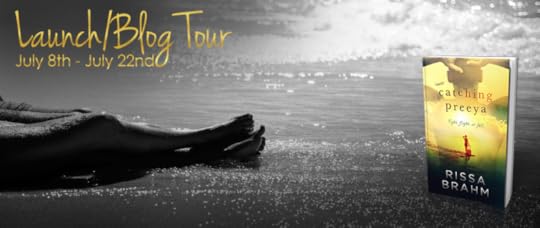

ABOUT THE AUTHOR: Contemporary romance writer Rissa Brahm grew up in New York and has since lived in all four corners of the United States, and beyond. The beautiful paradise of Puerto Vallarta, Mexico—the core setting of her hot & heartfelt debut series, Paradise South—is Rissa’s most recent and beloved home.
After two decades of working in the rigid—and sometimes blurry—world of finance, she's taken hold of her truest dream, writing hot and heartfelt stories full time.
When not chained-by-choice to her MacBook, she is embarking on outdoor adventures with her husband and little girl, laughing to tears with a good rom com, eating amazing Indian food with something chocolate for dessert; reading good, hot scorchers in bed; biking, long walks, and yoga; zoning out to killer music from across the decades and the globe; and getting lost only to discover a new exciting route home again. You can connect with Rissa on Facebook, Twitter or by email anytime by heading to www.RissaBrahm.com.
a Rafflecopter giveawayJuly 18, 2016
What to do When Your Rhythm Changes
An excerpt taken from my new book, Indie Confidence: Finding the Gumption to Get Your Story Out of Your Bones and Into the World.
It was not supposed to happen this way.
Earlier this year, I developed a rhythm that felt true to my season. Wake up at 4:44, write for a bit, go to work. In my mind, I figured that season was only temporary and eventually I would have the mental acuity to jump back into creative challenges like writing a novel and facilitating a writing community. I mean, I’d done something like this before — I wrote my first book while teaching full time, writing curriculum for a completely new class, and commuting to and from the school. Surely I could do it now?
I put on my super hero cape and waited for the moment to happen. It never did. For the next few months, my best thing would be managing to make myself dinner seconds before I collapsed on the couch and binge-watched episodes of Homeland.
But I kept thinking: it'll be over soon. It'll be over soon. It'll be over soon.
The way our training went, we had a five week intensive before getting out on the floor with heavy supervision. During this week, they were watching for signs of folding under pressure. They were also looking for what happens when we exceed expectations. At the beginning of August, right before I was going to be placed on a team, I received an email.
Because of my performance, I was selected for the Business team. Better hours, easier customers, swift potential for growth, and spiff pay.
I called my dad in shock. "I think I was just promoted?" I questioned, half laughing. From that point on, feedback was consistent: you're here because you're good. You're here because they see you as the best. You're here because you're talented and intellectual and you're going to kick ass.
But this was at work. At home I was drooling on the couch. There was no productivity happening. It was a miracle when I had the energy to do the dishes. For weeks, I held on to the beginning of August as a green light. THIS would be the moment I would get with the schedule and understand what I can and cannot do. THIS will be the catalyst of really letting the information I learned sink deeper than surface level. I won't merely be surviving at this point — I'll be deep in a rhythm.
And then my rhythm changed. Again. The moment I gained control, it was ripped out of my hands. And man if this isn't a metaphor for blogging or art in general.
You suffer through a few mornings of stumbling into your writing space to pen some words, knowing at any moment, the novel you know is buried somewhere within you will surface. Then, the day after the words finally break free, your schedule significantly changes and you lose that rhythm....
Or maybe you make plans to write three times a week. You have everything down to the letter and have never felt more inspired. But then, you stumble across an author’s website that has the exact same aesthetic as you, thousands of readers, and even makes you feel as if you're reading your words. In any other world, you would feel as if you found a kindred. In this world, crashing into this corner of the internet has left you with every single doubt and not a shred of words you had before....
If this is you, I want to say this: you're not alone and it doesn't have to stay this way.I'm not sure when the shift happened for me. I was on the business team for about three weeks before things started to have their own flow. I woke up with Russ in the morning and had a cup of coffee while I wrote some words. I remembered the beauty of journaling for ME and no one else. I forced myself to do that which inspires, rather than deadens.
And hello, conviction: Netflix is great for a moment, maybe a few. But it most assuredly deadens that creative flow.
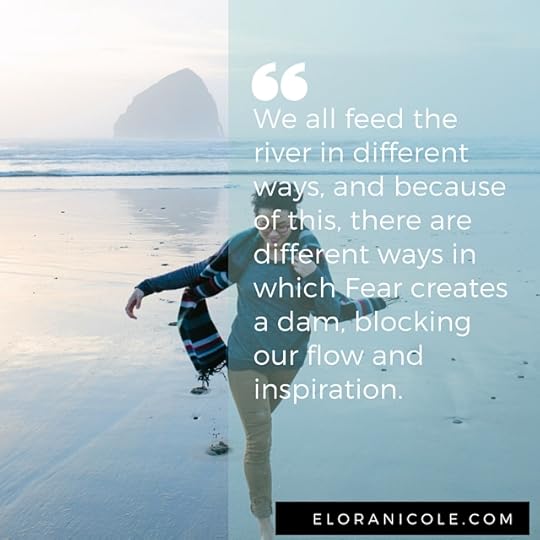
We all feed the river in different ways, and because of this, there are different ways in which Fear creates a dam, blocking our flow and inspiration.
For me, it was the uncertainty of rhythm. Might as well not create anything if I can't be consistent, was something I heard myself whisper many times during August.
Don’t be afraid to battle those things holding you back. Brainstorm what it looks like for YOU to write and finish a book — not the entirety of the industry. Cling tight to the truth that there are words still holding on for dear life internally, and eventually, your story will be told because you chose to listen to the voices saying you can push through any resistance that heads your way.
That's what makes the indie community great: individually, we can do pretty impressive things. Collectively, we're unstoppable.

Thoughts to Consider:
1. How are you waiting for the future in order to create? How can you harness where you're at now to begin a rhythm?
2. How is Fear creating a dam in your creative flow and inspiration?

Grab My New Book!
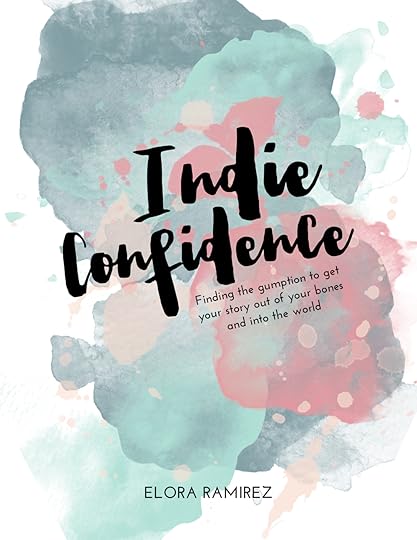
This book is for the creative who knows you have a story to tell but you have no idea where to start.
Let me help you: you don't have to wait for the gatekeepers anymore.
The time for your book is now. There is no excuse. You know this — you feel it in your bones. That's what this book is for — that's why I wrote it.
Ready to begin?
Find it here on Amazon.
July 11, 2016
101 Blog Post Ideas for Authors

I get it. Not only do you have to think about building discipline within your writing craft, you also need to keep moving forward with your manuscript nd keep an online presence somewhat active. That means writing in your book and writing online.
Feels impossible most days, yeah?
I'm all about going where your core genius takes you, and I know plenty of authors who aren't blogging anymore. But. If you're like me and just can't say no to this online space, let me help you out.
How I would use this list: there are over 100 topics here and a lot of them can be broken into multiple posts. Definitely enough for one per week for an entire year. When you're feeling stuck, grab the one that resonates. Or, just move down the list. As always: make it your own. That's where your voice really shines.
xoxo and happy blogging!

What parts of the book writing process make you feel alive, joyful, and creative?The Five People You Admire in Your Industry (and Why)
>> PRO TIP :: these five people could be interviews in the future which would include FIVE MORE POSTSWhat’s the biggest challenge you’ve faced as an author? What did you learn through this challenge?Fill in the blank: Lessons that have changed the way I _____________________.What questions should people ask themselves before jumping into writing a book?Write about three ways people talk themselves out of writing.My Top 10 Favorite Books and Why They Rocked My WorldHow to Build a Manuscript PlaylistWhy is Indie Publishing Important?Why did YOU choose indie publishing?A peek into your process (for me, this could be snapshots of notes I’m taking while writing or editing)Write a Post Filled with Resources for WritersFill in the blank: Why __________ Matters to Me.The Three People Who Support Me the Most in Writing
>> AGAIN: possible interviews = 3 more blog posts!Why it’s Okay to ___________________Top Three Books or eCourses that Have Impacted Your WritingAnswer a Question from a ReaderA Day in the Life of (Your Name)Look over your last five blog posts and see which one resonated the most. Replicate the post into a new one.Review a book that fits within your genre.Take some time to look through magazines. Keep your journal next to you. Write down every single blog post idea that comes to you because of a picture or article. Add those ideas to your folder on your computer. Write about one of them today.Write about the last book you read.How do you think indie authors could improve the industry?Fill in the blank: There is nothing wrong with your ________________.Write about how you use description or figurative language or syntax within your writing. When did you begin noticing the way words string together? (You know what? There’s two blog posts here….not just one)Write about the most unique character you’ve ever written. What makes them unique? How did they surprise you?Write about the most unique character you’ve ever read. What makes them unique? How did they surprise you?What mistakes have you made in publishing? Write about one of them.Write about why you love your current manuscript so muchFill in the blank: Things that are making me feel totally _________________.A No-Brainer Checklist for _________________.How to Choose the Right Book to ReadI Met My Hero, ____________ and Here’s What I Learned.From the Cutting Floor — deleted scenes and ideas and (if you’re particularly brave) moments of severe editing (this could turn into a series)Write a Letter to Your ReadersWrite about something controversial within the industry. Be bold with your opinion.Make a bucket list for your books + writing.Blog about something you enjoy that doesn’t immediately relate to your brand. Show your readers a different side of you they haven’t seen.Fill in the blank: Why I’m No Longer Satisfied With ___________ and what I’m Doing About it.What about your location inspires your work?10 Reasons You Should Hire an EditorWrite a poemFavorite TV shows? How are they inspiring you in writing?Pull a comment from your blog to use as a blog postA Room of One’s Own: Write a post about where you write — your office, your couch, your bed — explain why THIS space is YOUR space.Blog about something you’re particularly serious about within your niche.Interview someone else! (These are great for collaboration + reciprocity)Share sources of inspiration or the story behind the story (for example — Every Shattered Thing began as a way for me to tell the story of a girl we mentored and it turned into something completely different)What you’ve learned from criticism / poor reviews (WARNING: be careful not to name, vilify or focus on any one specific review. Take this as a general approach and not laser-sharp).Share something a little more personal. Your childhood, how you grew to love writing, a bit about your family — draw back the curtain a little bit and let your readers see you.The Five Ways I’ve Learned How to Succeed in the Midst of FailureWhat music is currently on your writing soundtrack?The Top Free Apps I Use for my Writing and Why I Think They’re the BestWrite a post that fits within the current season — like how to keep your word count up during the holidaysWhat’s Currently Inspiring MeNonfiction topics related to your manuscript (ie: sex trafficking numbers during Super Bowl weekend for Every Shattered Thing) This sort of thing works really, really well if a current event parallels with your plot!How to Create Your Own BookClubCreate questions book clubs can use about your bookHow do you stay organized as a writer?Pull from your list of blog ideas. Write the one that gets you most excited.Six Ways I’m Creative Outside of WritingUpdate an older blog post with new and relevant information. Share it.Write About Work + Family BalanceWhat do you hope the industry will look like in ten years? What are your dreams not only for yourself but the publishing world as a whole?Write micro fiction.How do you choose titles for your books? Fill us in that process.Explain the difference between editing and revision.Create an eBook out of a previous series you’ve done on the blog, and then write about that processInvest in Soundcloud and read your book / manuscript and create audio files of your book in progress / manuscript.Share your why — behind reading, writing, blogging, a particular manuscriptHow did you choose your editor?Share your playlist and why certain songs fit within certain scenesHow do you overcome writers’ block?Highlight your favorite writing websitesReach out to a local indie bookseller about selling your book and write about your experienceWhat’s your marketing philosophy? Write about it.The Five Biggest Distractions I Have in Writing and How I’m Dealing With ThemHow Journaling Saves my WritingThe Biggest Myth about PublishingWrite a love letter to other writers and authorsThe Three Mistakes Every Writer Makes on the First ManuscriptTell us how you came up with character names in your novelsIf you use Pinterest for book writing, fill us in on that process.How did you come up with the setting for your book? How do you go about using the setting as an essential character?Research Amazon and other indie sellers and share your findingsHow do you create believable dialogue? Share your tips.Take us through the process of developing a believable villainFormatting: do you do it yourself? If so, give us some hints! If not, how did you find your formatter?Discuss the difference between manuscript POVs — which one do you tend to write from most often and why?If you work full time, how do you balance working and writing?If you write full time, how do you balance life and writing? (This is good even if you work full time, really)How to create a blogging scheduleHow do you create content with purpose and intention?How do you find your writing voice?Write about the moment you completed your first manuscript. How did it feel?Write about the moment your first book was published. How did it sell? What did you do to celebrate? What are things you learned?Why did you decide to write in the genre you’re writing in currently?A List of your favorite books this year. Be specific on why you like them.How do you handle rejection and disappointment as an author?Write about your TBR list and why you’re excited about the books.The Time I Almost Gave Up….And What Kept Me Going.

Grab My New Book!
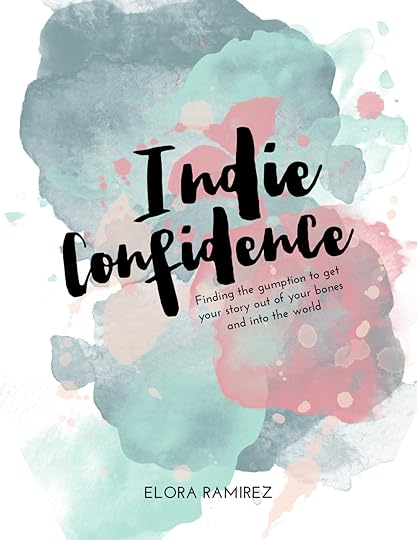
This book is for the creative who knows you have a story to tell but you have no idea where to start.
Let me help you: you don't have to wait for the gatekeepers anymore.
The time for your book is now. There is no excuse. You know this — you feel it in your bones. That's what this book is for — that's why I wrote it.
Ready to begin?
Find it here on Amazon.
July 7, 2016
What is Voice?
I used to ask my students all the time: what is voice?
They would stare back at me in silence. The smarty pants and those trying to impress me would attempt to answer but would fall short, their voices trailing off into awkward silences. I would pace the front of the classroom, twirling my expo marker between my fingers, and listen.
No one really ever came close to the definition. Not even me. It's a question I'm still trying to answer.
What I know: a writer's voice cannot be contained.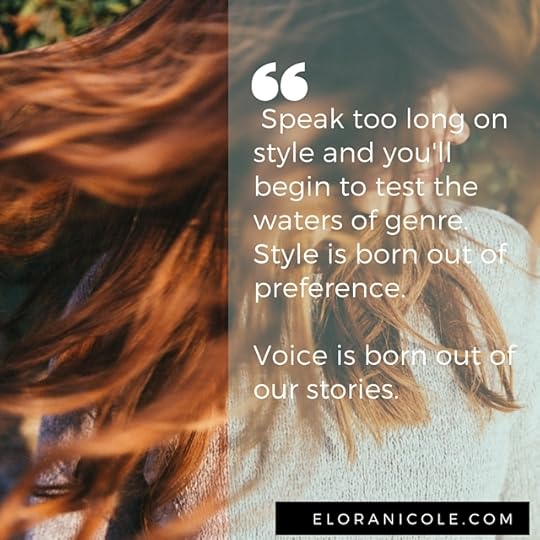
It's different than style. I may try on a style that's separate from one I've exhibited before: technical writing, poetic verse, creative nonfiction. Speak too long on style and you'll begin to test the waters of genre. Style is born out of preference.
Voice is born out of our stories.
I found mine in between the lines of a well-worn journal and in the blinking cursor of a blog post draft. For years, I couldn't even journal. Too afraid of others finding the source and reading my truth, I never really desired to go there. Words are heavy, though. I finally gave in and scribbled everything down: the good, the bad, the ugly, the secret.
In discovering who I was beneath all of these protective masks, words and memories appeared out of thin air. Almost as if they were waiting for the moment I would take myself seriously enough to hear. In her book When Women Were Birds, Terry Tempest Williams mentions that her handwritten journals confirmed for her that she experiences each event in her life twice — once in the world and once again on the page. By writing everything down, I was letting my psyche know: even though no one else is listening to you, I am. I will bear witness to these stories.
This changed everything.
My voice comes from those pen-filled pages. Read my stories, my blog posts, my novels, my poetry and will you hear me.
This is something we often don't speak about in writing: in order to find your voice, you have to find yourself.Not everyone is born a writer. But, for those of us who hold words deep in our bones, we know the sharpness of swallowing them. The act of silencing ourselves marks us, and most often, serves as a closure to the pattern of silencing we experienced our entire lives.

1. What would happen if you made the decision to not swallow any more of your words? What if you opened that journal or that blog post and wrote it all out?
Word by word, the language of women so often begins with a whisper. - Terry Tempest Williams
2. Find an old journal. Read your words. Are they a whisper? How do these entries reveal your voice? If you don't have old journals, think of a moment in which you used your voice for the first time. How did it feel? Write about it.

Grab My New Book!
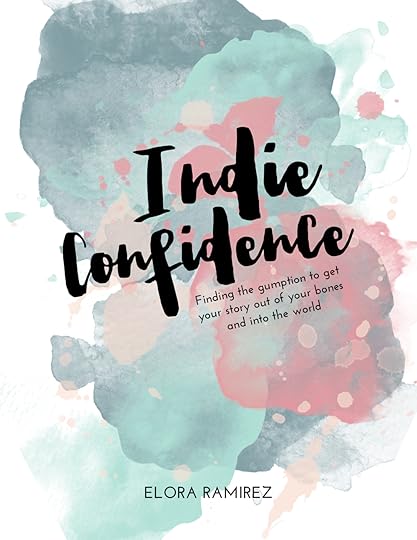
This book is for the creative who knows you have a story to tell but you have no idea where to start.
Let me help you: you don't have to wait for the gatekeepers anymore.
The time for your book is now. There is no excuse. You know this — you feel it in your bones. That's what this book is for — that's why I wrote it.
Ready to begin?
Find it here on Amazon.
July 5, 2016
Three Hints to Sharing Your Story Well
Given the choice between trivial material brilliantly told versus profound material badly told, an audience will always choose the trivial told beautifully — Robert McKee
If there's one thing I hear the most when people hear that I'm a story coach it's there's no way I could write a book...my life isn't that interesting.
Well, yeah. Especially if you're comparing your story to all of the others being told.
Here’s the thing. So many of us refrain from sharing the every day because we feel it’s boring. Who wants to read about our family road trips and what we perceive as monotony? We don't even try, because we haven't lived the near death experiences. Or we haven't traveled the world. Or we haven't gone through tremendous road blocks to get where we are today.
What this creates is over-saturation of amazing-epic-adventures that aren’t really based in reality.
So you have the numerous stories of traveling the world and snapping pictures of obscure places and writing about the mis-adventures of riding tuk-tuks across the canyon, while the rest of us deal with budgets and groceries and schedules and soccer practice. You have the memoirs of people who blaze a trail all by themselves or put in 80 hour weeks teaching students in a low-income area, while the rest of us pour everything we can into a classroom with just enough resources, just enough success, and just enough routine to make us feel average.
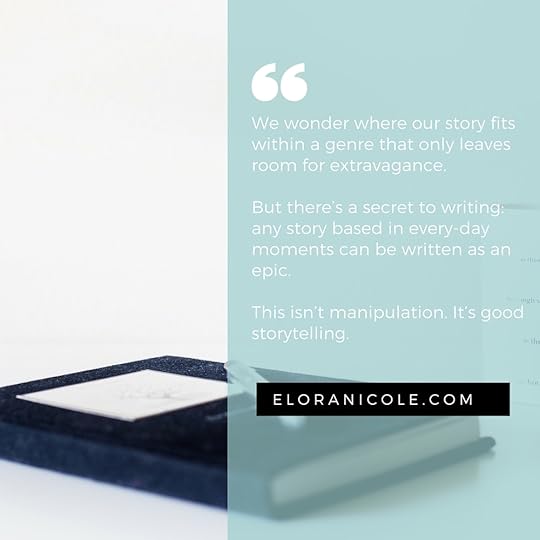
We wonder where our story fits within a genre that only leaves room for extravagance.
But there’s a secret to writing: any story based in every-day moments can be written poetically.
This isn’t manipulation. It’s good storytelling.
Like the moments my husband makes me laugh so hard I cry, or the times I embarrass myself in public, or the days I spend watching rain fall from my window. If I tell the story well, anything can be used.
Any moment can feel brilliant, just like any adventure can sound boring.It’s how you tell the story.
So how do you avoid sharing a story that falls flat?
SLOW DOWNPart of writing is capturing a moment. Refuse the impulse of blazing through what happened. Think about the structure: does what you're writing have a beginning, middle, and end? It’s easy to approach storytelling thinking that all you need to do is throw words down and walk away. Take a breath. Then, take another one. Close your eyes and move through the story as if you’re experiencing it all over again.
SHOW, DON’T TELL
Maybe you heard your English teacher say this in school. Basically, this means adding as much specificity as possible. Instead of, “OMG this book was so incredible because these characters blew my mind and isn't the cover gorgeous?!” show us how incredible the book was — be willing to dig your heels in a little bit to make sure your reader understands. When you slow down, it's easy to show us. Take a breath. It was the perfect day for a storm, sure. But why? Did the humidity fall on your skin like a wool blanket? Did the perspiration pop on your forehead only minutes after going outside? Were the clouds billowing on top of each other, darkening by the minute? Take us there. Remember the senses: what you see, what you feel, what you hear, what you smell, what you taste.
Let us feel it too.
BE CREATIVE
Anyone call tell us about watching the groom’s face light up when he saw his bride for the first time, but what about capturing how the best man was whispering jokes under his breath or how the bride’s aunt burst into the dressing room seconds before the wedding began? What about a bridesmaid managing to help sew the zipper back into the maid of honor's dress without the bride ever finding out about the small tragedy?
There are the obvious moments we immediately move toward when we tell a story. These still move the plot forward, but in a predictable way. Instead, reach for the hidden narratives we don’t often see. Not only does this engage the reader, it also adds depth to our characters and plot. We no longer reach for tropes or stereotypes. Our story becomes layered.
Sabrina Ward Harrison has said before that we need more stories of the every day — of people sharing what it really looks like to live this life. Normal is relative, right? So what you perceive as mundane may appear magical to someone else.
The stories we know and love, the ones filled with adventure and narrow escape and unbelievable moments, those are great. They're inspirational. We read those stories and think, "that's amazing, but it will never be me."
But.
You can live a good story, a beautiful story, that is worthy of sharing. You can experience adventure that's breathtaking and full of moments people will want to know. Every single moment of our life has the capacity to bring magic and wonder — it's just a matter or whether or not we're willing to see it. Whether we're willing to share it.
Will you?

Thoughts to consider:
1. How are you buying into the belief that your story doesn't matter?
2. If you are currently in the middle of a manuscript, how can you slow down your descriptions? What are ways in which you can elevate the creativity of how you tell the story?
3. Think of a moment that felt mundane while you lived it, but looking back you realize its importance. Write about it using the tips in this post. Share it if you're brave. (I know you are).

Grab My New Book!
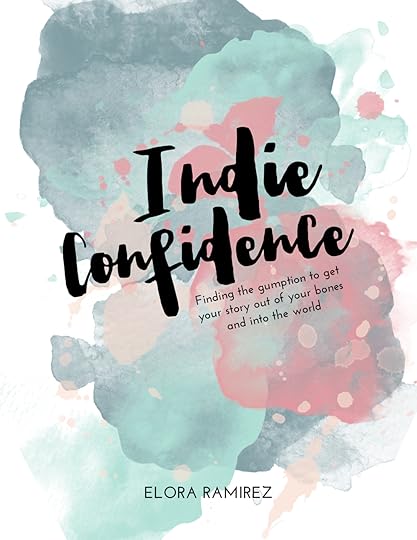
This book is for the creative who knows you have a story to tell but you have no idea where to start.
Let me help you: you don't have to wait for the gatekeepers anymore.
The time for your book is now. There is no excuse. You know this — you feel it in your bones. That's what this book is for — that's why I wrote it.
Ready to begin?
Find it here on Amazon.
June 5, 2016
How to Become a Student of Your Own Creativity
Back in January, I started something. I erased everything on my white board in my office and wrote down every month for 2016.
I was curious what would happen if I tracked my own creativity.
So instead of writing down goals for each month, I just catalogued what I actually did.
Eight books read.
5,000 words written.
Ten smoothies consumed.
I knew it had to be a holistic effort. I couldn't just track words written. I needed to make sure I was actively chasing what fuels me rather than expecting words to create themselves.
Since January, I've written close to 50,000 words. But most of these words were in February. My past few months have looked pretty barren.
I'm learning to be okay with this.
I came into this year certain of one thing: I had to learn how to take better care of myself and the story I'm meant to tell. And so I've been listening. Lunch with my coworkers instead of pushing myself to get another email or blog post written? Done. Time with Russ in the evening instead of sitting at the table with my headphones on? Yes, please. Reading a book that makes my spirit skip a few steps because of it's quality? Amen.
With the slowness has come an ultra-bright clarity.
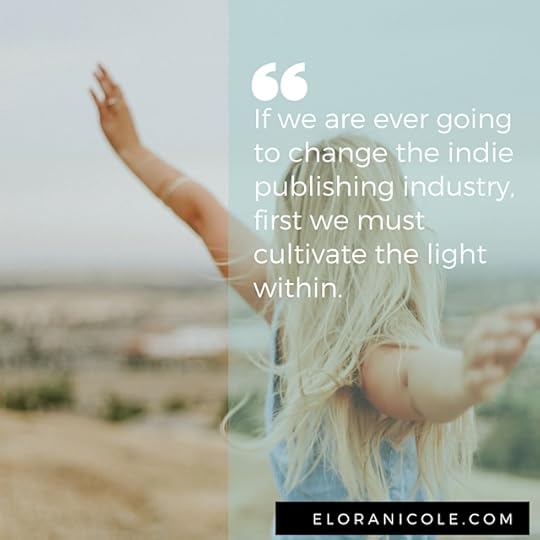
If we are ever going to change the indie publishing industry, we must first cultivate the light within our own creativity.
By looking within, we enable ourselves to know our why with more fullness. We gain the freedom to write what we want, stay true to our soul, and follow our intuition with gumption.
This is the kind of creativity I want to live.
It's not a sprint to the finish line — that's what this year has taught me. There are no quantifiable steps to get someone from point A to point B. It just happens. The story is there, or it isn't, or it's percolating for a spell.
But you can't rush creativity. It thrives under the slow burn.

Thoughts to consider:
1. How are you rushing your creativity during this season? What are ways you can slow down, allowing your words to fully develop?
2. Take a good, long look at everything on your plate. What are you involved in or what have you agreed to that simply doesn't serve you and this season? Where do you need to say no so you can say yes to things that make you feel awake?
3. Breathe deeply — three full breaths in and out. For each breath, whisper I am creative and I have a story. What thoughts surface?

Letters From the Creative Underground
Writing is more than articulation, it's allowing yourself the space to hear the truth that you have something to share. Letters from the Creative Underground is the fuel you need to remember the truth: you are a writer. You have a story.
And we desperately need to hear it.
Subscribe
Delivered straight to your inbox every Thursday.
Success! Now check your email to confirm your subscription.
There was an error submitting your subscription. Please try again.
Email Address
Sign Up
I won't ever spam you. That's lame.
Powered by ConvertKit
May 23, 2016
When Creativity Asks to be a Marathon
I'm working on a new book.
I wasn't expecting this. In fact, back in December, I set intentions around me completing my memoir by March. And well, obviously this isn't gonna happen. It wouldn't even happen if I negotiated an extension and told my creativity I would be done by June. I know the time it takes for me to finish a book now, and if I sat down and wrote about 1000 words a day, I would definitely be nowhere near wrapping up that particular story.
But a few months ago, I realized something that stopped me in my tracks.
This doesn't really matter. All of the moving and breathing through scenes, all of the struggle with wrangling the narrative, all of the wondering why it felt so difficult to write about my own life: it's part of it all. My memoir will be a marathon.
I think I always knew this was going to be the case. I mean, I started this book three years ago when my husband and I went away for the weekend. Sitting on the balcony as the sun ruse above the clouds, I penned what would soon become the first chapter. Since that moment, my ideas for what the over-arching theme would be have morphed consistently.
Adoption.
Creativity.
Finding my voice.
Building a life out of words.
Friendship.
It's only been recently — as in a few weeks ago — that I finally understood how it all comes together. Every single piece. Because of this, those words and pages need space and breath to grow. And so, my words slow to a crawl for that particular project while they spill out fast and hot on another that wasn't planned.
This is creativity.
Building, moving, growing, changing, inhaling, exhaling — it's all a dance. You think you have it figured out. You think you know what's happening behind the scenes. And then something else will happen: a shift in character, a real-life glitch, a flash of inspiration.
Before you know it, you're chasing the muse, desperately reaching for her coat tail so she doesn't get away.
This takes a lot of grace.
It's easy to get down on yourself — to say things like, you should have seen this coming or you need to be better prepared. But all of that is useless self-talk that will get you nowhere.
This is what I'm learning. It's easy to say things like I want to become a student of my own creativity. But when things up and twist themselves inward, and suddenly your goals become catty-wompus because the thing you were working on is now the thing you know you're not meant to produce in this season, well that makes your practice a little tricky.
Every breath we take is an opportunity to give ourselves, and our creativity, grace.
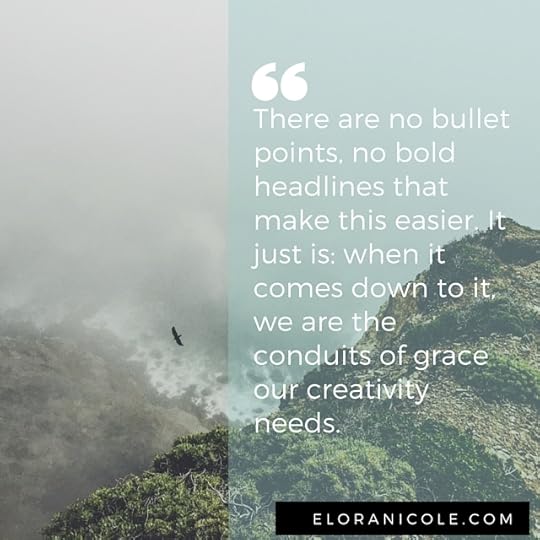
There are no bullet points, no bold headlines that make this easier. It just is: when it comes down to it, we are the conduits of grace our creativity needs.
Think about your own projects. The ones you wish you worked on more consistently and the ones perking up in the corners of your soul just at the mere possibility of you paying attention to them. Which one of these is pulsing with life? Which one of these is needing to stretch and is waiting for you to make room?
When I stumbled on this new book, it was through a text message.
"I wish I had something like _______."
Jolt of electricity. Chills down my arms. Brick in my throat.
"Oh. I have that. Well. Not that exactly...but definitely the outline."
Later I would open up the file, shaking off the dust from words I penned not too long ago. Sure enough, those jolts of electricity quickly became tiny spheres of connection. It wouldn't take long to scroll through and get the old familiar feeling back in my bones — there is something here. Pay attention. Develop this.
And so, a project was (re)born.
It's all that writing is, really. Open hands, ready for the jolt.
It is winter. Ravens are standing on a pile of bones — black typeface on white paper picking an idea clean. It's what I do each time I sit down to write. What else are we to do with our obsessions? Do they feed us? Or are we simply scavenging our memories for one gleaming image to tell the truth of what is hunting us? — Terry Tempest Williams

1. What in your creativity is asking to be a marathon? How does this make you feel? What is your next step in getting to the finish line?
2. What connections are you making this week that may prove useful for your creativity? These can be conversations, books, movies, TV shows — anything can be a catalyst for inspiration if we're open.
3. What in your creativity is hunting you? Why are you running from it?

Letters From the Creative Underground
Writing is more than articulation, it's allowing yourself the space to hear the truth that you have something to share. Letters from the Creative Underground is the fuel you need to remember the truth: you are a writer. You have a story.
And we desperately need to hear it.
Subscribe
Delivered straight to your inbox every Thursday.
Success! Now check your email to confirm your subscription.
There was an error submitting your subscription. Please try again.
Email Address
Sign Up
I won't ever spam you. That's lame.
Powered by ConvertKit
May 16, 2016
How to Build Your Publishing Calendar.
When I set out to write a novel, I know it's going to take me about two months to complete. I know this because of my experience writing three other novels. I wrote a majority of Every Shattered Thing in a month. I wrote Somewhere Between Water and Sky from mid-March to the last week of May. And Secrets Don't Keep was written from December to early February.
Publishing calendars can be tricky. There's a reason I use pencil in most of my calendars — especially when it comes to book-related dates. So many things can change at the drop of a hat, it's almost impossible to know when you'll really finish the manuscript.
But deadlines are powerful.
Without deadlines, I would never write another word. Having something blocked out in my calendar, something that I'm producing with the intent to share, something that other people most likely know about and are waiting for their chance to read, proves convincing when I'm trying to decide between projects.
Having an agent was great for this. Giving her a date — "I'm going to have this book to you by February 8" — made it impossible for me to procrastinate. I couldn't. Even if my brain was being sidelined by another plot bunny (totally happens) or I'm waylaid by sickness, the separation from my words doesn't last for long. The pressure (for me) serves as the best catalyst.
But what about when there's not an agent? What about when there isn't an audience necessarily waiting on the other end of the manuscript? How do you set a publishing calendar?
Be honest with yourself.I know that there isn't any way I will be writing five books this year. I won't even be writing three. At the most, I will maybe squeeze in two. I know this because of my own limitations: I'm working 40+ hours a week, there are relationships I want to cultivate, and I have other passion projects I'm pursuing this year.. Projects that are just as noble as the paperbacks with my name on them.
Be honest with yourself about your own capabilities. Set smaller goals first, especially if you haven't finished a manuscript before. Aim for 10,000 words in a week or 2500 words in a day — tiny chunks that can be carved into a manuscript. Once you have one under your belt, you know your own habits. 10,000 words in a day has happened once for me. I know there is really no reason for this to be an expectation in my own writing.
However, 5k word days are pretty common when I'm in the midst of writing, so this is something I often aim for when I'm trying to complete a manuscript. What's important is knowing what works for you. Not everyone can do 5,000 word days, and some people may consider 5,000 word days standard.
Know your process, be honest about it, and move on.
Share with someone on your tiny slip of paper.Brené Brown has a slip of paper in her wallet of people who matter. When you're in the midst of creation, opinions are fierce. You experience it almost instantaneously. You're writing too much or you're not focusing enough. You're staying up too late or you're wasting time. Your story is the best they've ever read or there's strange silence on the other end of the line.
The opinions that matter in these seasons are miniscule. They are the ones that are on your tiny slip of paper — the three or four names that you know share the same dirt as you in the arena. They're getting their hands dirty with their own art and dreams and because of this, and because of how they've had your back repeatedly, you know they know you. You know they want you to succeed. These people are for you in every way.
And they will be damn sure you finish this manuscript if you tell them the deadline.
Leave room for error.Life doesn't give us cushion. There's not a warning label on a particular month where we know to leave some extra room for that unexpected something to happen. However, when you're planning out your year, you can cushion the dates.
Whenever I'm setting a publishing date, I easily add two or three weeks around my editing time. I also overshoot my completion date, knowing there will be two or five weeks where I feel hopelessly stuck. All of this usually places my publication date a solid month past what I could probably get away with, but I'd rather have an extra month at the end to plan a really amazing launch then feel rushed because I didn't anticipate the week I battled with the flu or the crisis at work I had to navigate.
Remember grace.You'll forget to change the spelling on that one word in chapter five. You'll forget a punctuation mark in your acknowledgements, creating a super-confusing sentence. The formatting on a specific chapter will be off or (personal story) you'll swap the page numbers so your book is opposite the industry standard (who pays attention to what page the even numbers are on and what page the odd numbers land?)
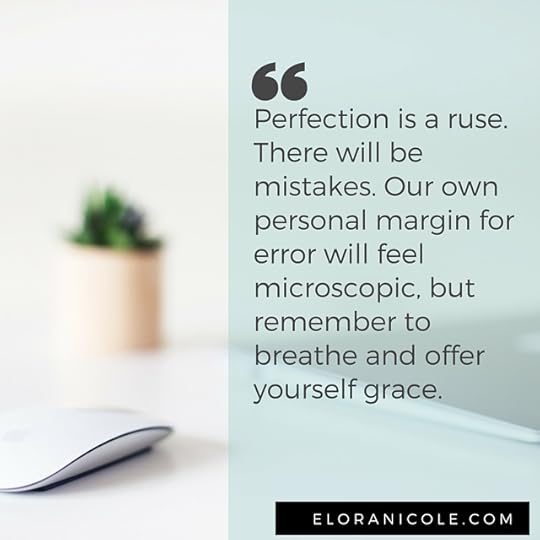
Perfection is a ruse. There will be mistakes. Our own personal margin for error will feel microscopic, but remember to breathe and offer yourself grace. The beauty of self publishing is that you can edit at any time. And with patience and care, and sound editing by someone who you trust and who is skilled, your manuscript will be so close to perfect there will be few who even notice the mistake you're freaking out about at 3:30 in the morning. Breathe in. Breathe out.
Remember your why.
And then start all over again.
Questions to consider —
1. Being honest with yourself, when do you believe you can finish your manuscript? MARK THIS DATE DOWN SOMEWHERE.
2. Who is on your tiny slip of paper? This week's challenge: email them and tell them your date. Ask them for help in accountability.

Letters From the Creative Underground
Writing is more than articulation, it's allowing yourself the space to hear the truth that you have something to share. Letters from the Creative Underground is the fuel you need to remember the truth: you are a writer. You have a story.
And we desperately need to hear it.
Subscribe
Delivered straight to your inbox every Thursday.
Success! Now check your email to confirm your subscription.
There was an error submitting your subscription. Please try again.
Email Address
Sign Up
I won't ever spam you. That's lame.
Powered by ConvertKit
May 8, 2016
Mother's Day.
A few years ago, Russ and I got into one of the biggest fights of our marriage. It lasted weeks. I don't even remember what started it initially, it was certainly nothing he did. I just remember feeling as if I was on a bed of fire, and I needed my outsides to match my insides. So I yelled. I nitpicked. I might have even punched a wall....the memory is hazy.
It wasn't until the storm was over that I realized the root behind my pain. I woke up one morning and opened up my computer to write and work and there — right in front of me — was an ad for Mother's Day.
This is grief, I thought. And then I wept.
.::.
I didn't want to be a mother when we started this process of adoption. I kept it at arm's length for so long, ignoring the call I knew we were meant to take. I'd known it for years. It was a rhythm I couldn't escape: this is the way, walk in it. But I didn't want that rhythm....that interruption. I was confused, scared, worried and overwhelmed.
I wasn't soft enough to be a Mother.
I wasn't right.
I'm not sure when the transition happened, but I do remember moments where I could feel my heart turning to this someday child of mine.
Overheard conversations between mothers and children.
Dreams where I wake up, certain our child is waiting for me.
The growing excitement of knowing The Call could come at any second.
My hesitation was all based out of fear: fear I wouldn't be enough, fear I would muck things up, fear this would cause more heartache then anything else.
That last fear. That's the one I reckon with the most.
.::.
Last week I could feel the emotions swirling internally. Every morning I woke up, the tears a liquid ball at the base of my throat. I art journaled, fighting the urge to scratch my pain into the pages.
And then yesterday, I went to Target for some vitamins.
In the early stages of our adoption, I would walk around Target and dream. I'd hold a onesie in my hand and imagine what it would feel like to shop for a baby — our baby — when it was our turn. I would weave in and out of the baby aisles, a small smile on my face, and pray.
Come soon, I would whisper. Come soon.
I'm not sure what propelled me to walk the long way around Target, maybe just habit or the internal chaos I could feel reaching fever pitch. There were a lot of families there. As soon as I walked in, two men approached the customer service desk and asked if they had flowers.
"You know, for Mother's Day."
I swallowed and kept my eyes focused. I walked around, noticing the clothes and the shoes and the fabric. One foot in front of the other, snippets of conversation falling around me.
And then I saw them. Crib sheets.
I wasn't even looking. They were an end cap by the carseats. I walked over, running my fingers over the fabric. The loss in my gut was palpable. I blinked and drew my hand back, as if the sheets themselves were on fire. I wouldn't cry there. I wouldn't be that person.
I got my vitamins. I checked out. I walked to the Subaru.
And I didn't cry until I pulled into our apartment.
his is not what my life is supposed to look like right now, this isn't right. I wiped my tears and walked up the stairs to our apartment. The anger felt real — tangible. I could hear the niceties — the when the time is right it will happen and there's a season for everything and everything else everyone always says when they don't know what to say to someone who's waited for so long.
But really, I just wanted silence. How can you tell others that when they notice the pain it makes it more prevalent for you? How can you also say that when nothing is mentioned there's a gaping hole begging for acknowledgment?
No one wins, here.
In the beginning, I feared the heartache. Now we know each other intimately.



